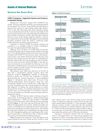 24 citations,
August 2020 in “AJGP”
24 citations,
August 2020 in “AJGP” A woman's sudden hair loss was linked to her previous COVID-19 infection.
 1 citations,
April 2022 in “Rheumatology”
1 citations,
April 2022 in “Rheumatology” A man developed autoimmune symptoms after the Pfizer COVID-19 vaccine, highlighting the need for thorough vaccine safety checks.
[object Object]  January 2024 in “American journal of clinical dermatology”
January 2024 in “American journal of clinical dermatology” Ritlecitinib is safe and well-tolerated for treating alopecia areata in patients aged 12 and older.
 7 citations,
July 2020 in “Journal of The American Academy of Dermatology”
7 citations,
July 2020 in “Journal of The American Academy of Dermatology” Skin symptoms linked to COVID-19 are hard to confirm, and more testing is needed to identify which are truly caused by the virus.
20 citations,
March 2022 in “Journal of clinical medicine” Nearly half of the studied men with long COVID had low testosterone, including younger men.

Topical Minoxidil is effective for hair loss after COVID-19.
 18 citations,
April 2021 in “Experimental Dermatology”
18 citations,
April 2021 in “Experimental Dermatology” COVID-19 may cause hair loss and scalp pain due to inflammation and changes in hair follicle receptors, but these symptoms typically resolve in 2 to 4 months.
 29 citations,
October 2020 in “Journal of the European Academy of Dermatology and Venereology”
29 citations,
October 2020 in “Journal of the European Academy of Dermatology and Venereology” Women with high androgen levels may have more severe COVID-19 symptoms.
 1 citations,
August 2022 in “Медицинский совет”
1 citations,
August 2022 in “Медицинский совет” The treatment with an oral drug and topical lotion is effective and well-tolerated for hair loss after COVID-19.
 3 citations,
September 2022 in “Frontiers in psychiatry”
3 citations,
September 2022 in “Frontiers in psychiatry” University students in Egypt experienced high stress during COVID-19's third wave, with negative coping mechanisms being more common.
 September 2022 in “Journal of The American Academy of Dermatology”
September 2022 in “Journal of The American Academy of Dermatology” A woman's COVID-19 related hair loss improved after using a specific hair care routine for 30 days.
 November 2021 in “Research Outreach”
November 2021 in “Research Outreach” Low testosterone levels may lead to more severe COVID-19 outcomes.
 4 citations,
April 2020 in “medRxiv (Cold Spring Harbor Laboratory)”
4 citations,
April 2020 in “medRxiv (Cold Spring Harbor Laboratory)” Men taking 5-alpha reductase inhibitors for prostate issues may be less likely to experience severe COVID-19, but it doesn't prevent ICU admission or death.
[object Object]  November 2022 in “Journal of Investigative Dermatology”
November 2022 in “Journal of Investigative Dermatology” COVID-19 patients with hair loss experienced greater cognitive deficits and more symptoms of depression, anxiety, and stress.

COVID-19 patients with hair loss experienced more cognitive issues and these issues were linked to higher levels of depression, anxiety, and stress.
23 citations,
April 2021 in “International Journal of Dermatology” COVID-19 may trigger systemic lupus erythematosus, requiring careful diagnosis and treatment.
 September 2024 in “The Italian Journal of Pediatrics/Italian journal of pediatrics”
September 2024 in “The Italian Journal of Pediatrics/Italian journal of pediatrics” COVID-19 vaccination may be linked to MIS-C in children, highlighting the need for quick diagnosis and treatment.
34 citations,
July 2020 in “Dermatologic Therapy” Searches for acne, hair loss, and eczema increased during COVID-19, while searches for other skin issues decreased.
 January 2023 in “Brazilian Journals Editora eBooks”
January 2023 in “Brazilian Journals Editora eBooks” Passiflora incarnata may help with anxiety and sleep issues but has side effects; teleconsultation for heart failure can improve quality of life; increased screen time for children during the pandemic led to more clinical complaints; older and severely affected COVID-19 patients are more likely to have long-term symptoms.
 January 2023 in “Brazilian Journals Editora eBooks”
January 2023 in “Brazilian Journals Editora eBooks” Passiflora incarnata may help with anxiety but has risks and drug interactions.
There's a genetic link between Fragile X Syndrome and Autism Spectrum Disorder.
6.7% of urine cultures showed hospital-acquired urinary tract infections.
Children used screens more during COVID-19, causing various health complaints.
Autism Spectrum Disorder is often underdiagnosed in females.
Dissociative disorders in childhood sexual abuse victims are more common in males.
Most pregnant teenagers are not dissatisfied with their body image but worry about weight.
Diagnosing tuberculosis after knee surgery is challenging due to non-specific symptoms.
Post-COVID-19 syndrome is more common in older, severely affected patients.
Psychiatrists should be part of pain management teams due to the psychological aspects of pain.
 10 citations,
September 2022 in “Psychiatry and Clinical Neurosciences”
10 citations,
September 2022 in “Psychiatry and Clinical Neurosciences” Long COVID affects over half of COVID-19 survivors, causing a range of symptoms like fatigue and neurological issues, with no specific treatment yet.
 June 2024 in “Al- Anbar Medical Journal”
June 2024 in “Al- Anbar Medical Journal” Acute telogen effluvium can be resolved by addressing causes, but chronic telogen effluvium is harder to treat.
 January 2023 in “Brazilian Journals Editora eBooks”
January 2023 in “Brazilian Journals Editora eBooks” Surgery to fix a broken upper arm bone can sometimes lead to nerve damage.
 January 2023 in “Brazilian Journals Editora eBooks”
January 2023 in “Brazilian Journals Editora eBooks” People with cleft lip and palate often have respiratory problems.
 May 2023 in “Journal of Clinical Medicine”
May 2023 in “Journal of Clinical Medicine” New understanding and treatments for hair loss are improving, but more research is needed.
24 citations,
March 2022 in “Genome biology” scINSIGHT accurately identifies cell clusters and gene patterns in complex data.
 5 citations,
October 2022 in “Heliyon”
5 citations,
October 2022 in “Heliyon” Polycystic ovary syndrome, a disorder causing menstrual issues and infertility, can be treated with lifestyle changes, medication, herbal remedies, surgery, and assisted reproductive techniques like artificial insemination and IVF.
 213 citations,
December 2020 in “Annals of internal medicine”
213 citations,
December 2020 in “Annals of internal medicine” Many COVID-19 patients still have symptoms like fatigue and loss of taste or smell a month after diagnosis.
 2 citations,
July 2021 in “Dermatologic Therapy”
2 citations,
July 2021 in “Dermatologic Therapy” A woman's hair loss after COVID-19 was likely due to a mix of pressure-induced alopecia and acute telogen effluvium.
 June 2022 in “Journal of the turkish academy of dermatology”
June 2022 in “Journal of the turkish academy of dermatology” The COVID-19 quarantine in Turkey disrupted dermatological care, increased stress-related skin issues, and showed the need for psychological support and teledermatology.


























